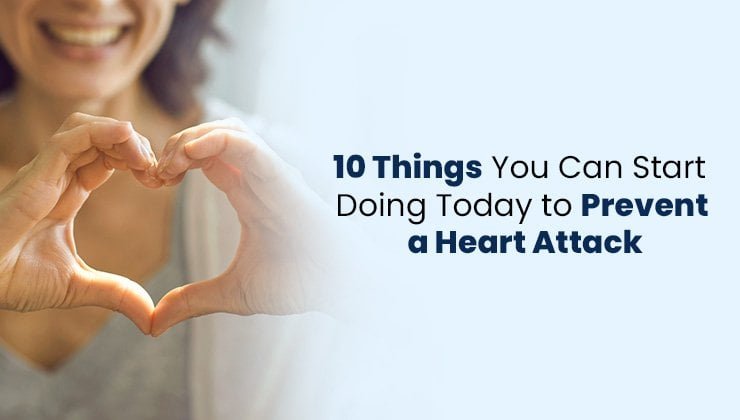Millions of people are suffering from heart attacks every year. Individuals may significantly reduce their risk of developing a heart attack by adopting healthier habits and making informed lifestyle choices.
Keep learning to know more about the 10 essential things to prevent a heart attack and protect your heart health.
Understanding Heart Attack
A heart attack, also known as myocardial infarction, occurs when the blood flow to the heart muscle is suddenly blocked or reduced due to a buildup of fat, cholesterol, and other substances in the arteries. If the plaque ruptures, a blood clot may form that can block arteries, causing a heart attack.
The symptoms of a heart attack include
- Chest pain
- Pain or discomfort that spreads to the shoulder, arm, back, neck, or upper belly
- Cold sweat
- Fatigue
- Heartburn or indigestion
- Lightheadedness
- Nausea
- Shortness of breath
What Causes a Heart Attack?
Understanding the cause of heart attacks is key to its prevention.The different causes of a heart attack are
- Coronary artery disease occurs when one or more of the heart’s arteries are blocked
- Severe physical stress
- Coronary artery spasm
- Certain infections, including COVID-19 and other viral infections
- Spontaneous coronary artery dissection
10 Things To Prevent A Heart Attack
Making lifestyle changes is the most effective way to prevent developing a heart attack and further complications. Some of the lifestyle changes that can help in preventing a heart attack are:
1. Eat a Heart-healthy Diet
One of the most effective ways to prevent a heart attack is to maintain a nutritious, balanced diet. It helps reduce inflammation, lower blood pressure, improve cholesterol levels, and promote overall cardiovascular health.
A heart-healthy diet should include
- Vegetables and fruits
- Beans and other legumes
- Lean meats and fish
- Whole grains
- Low-fat dairy foods
- Healthy fats, including olive oil and avocado
It is recommended to limit saturated and trans fats, processed meats, added sugars, sodium-rich foods, and processed snacks. Many scientists recommend the DASH and Mediterranean diets to help with heart health.
Additionally, it is essential to balance a diet with regular physical activity to maintain heart health.
2. Exercise Regularly
Physical activity helps improve circulation, lower blood pressure, and maintain a healthy weight. Even small bouts of physical activity may be beneficial for the heart.
The American Heart Association recommends at least 150 minutes of moderate-intensity physical activity every week or 75 minutes per week of vigorous aerobic activity or a combination of both spread throughout the week.
Regular exercise also helps lower LDL cholesterol and increase HDL cholesterol levels. It also helps relieve stress and improve mood, and lowers the risk of cardiovascular disease.
Even activities, including gardening, household chores, and taking the stairs, may be beneficial for heart health.
3. Control Blood Pressure
The optimal blood pressure is about 120/80 mmHg. High blood pressure may increase the risk of heart attack, stroke, and kidney disease over time.
Blood pressure can be controlled by reducing salt intake, exercising regularly, managing stress, limiting alcohol, and taking prescribed medications if required. Monitoring blood pressure is key to preventing the risk of a heart attack.
4. Quit Smoking or Using Other Tobacco Products
Smoking is another major risk factor for heart attacks. Chemicals in the tobacco may damage the heart and blood vessels. It may also raise the blood pressure and heart rate as smoking makes the heart work harder.
So, quitting smoking may decrease the risk of developing a heart attack. Also, it is preferable to stay away from secondhand smoke.
5. Maintain a Healthy Weight by Controlling Cholesterol
Being overweight, especially around the middle of the body, may lead to conditions, including high blood pressure, high cholesterol, and diabetes. These conditions may raise the risk of a heart attack.
The risk of developing heart disease is higher if BMI is over 25 and the waist measurement is greater than 35 inches for women and 40 inches for men.
Aiming for slow weight loss through diet and exercise is the most sustainable way to reach and maintain a healthy weight.
6. Manage Stress Effectively
Chronic stress has been linked to developing different conditions, including higher blood pressure and other risk factors for heart disease. It may also lead to unhealthy behaviours, including overeating, smoking, or a lack of exercise.
Practice relaxation techniques, including deep breathing, meditation, or yoga, to reduce stress and thereby reduce the risk of developing a heart attack. Also, consider talking to a therapist or a counsellor when required.
7. Limit Alcohol Consumption
Excess alcohol consumption may raise blood pressure, cause irregular heartbeats, increase cardiomyopathy, stroke, cancer, and heart attack.
The National Institute on Alcohol Abuse and Alcoholism defines one drink as 5 fluid ounces of wine, 12 fluid ounces of regular beer, or 1-½ fluid ounces of 80 proof spirits. It is recommended to limit to one drink per day for women and two drinks for men. Do not exceed the recommended limits.
Also, you may talk to your healthcare professional about drinking alcohol if you have recently had heart surgery, take medicines for your heart, or have a heart condition, including arrhythmia.
8. Have Regular Health Check-ups
Routine health check-ups may detect early signs of heart disease and allow for timely intervention before they lead to a heart attack. Important health screenings include
- Blood pressure every two years
- Cholesterol levels every five years
- Type 2 diabetes for every three years
If you have high cholesterol, high blood pressure, or diabetes, talk with your healthcare professional. Your doctor may recommend lifestyle changes and, if necessary, prescribe medications to manage these conditions and reduce the risk of heart disease.
9. Get Adequate Sleep
Poor sleep may lead to high blood pressure, obesity, and insulin resistance, which are risk factors for developing heart disease, including a heart attack.
Adults require seven hours of sleep every night. If you feel you don’t get enough sleep or are tired throughout the day, it is recommended to talk to your healthcare professional to be checked for obstructive sleep apnea.
Treatment for obstructive sleep apnea includes losing weight, sticking to a consistent sleep schedule, creating a relaxing bedtime routine, and avoiding screens and caffeine before bed.
10. Manage Diabetes
Diabetes is a lifelong condition that may increase the risk of a heart attack and risk. High blood sugar levels may damage blood vessels and nerves that control the heart.
It is preferable to monitor blood glucose regularly by having regular medical checkups and prescribed medications. Also, work with your healthcare professional to eat healthy, manage weight and stay active.
Conclusion
Preventing a heart attack can be made with lifestyle modifications, including eating a nutritious diet, exercising regularly, managing stress, avoiding smoking, limiting alcohol, and getting routine check-ups. Making small, consistent changes is often more effective.
You may talk to your healthcare provider to better understand your risk factors and discuss a suitable treatment plan. If you are in Chennai and have questions regarding your heart health, please feel free to book a consultation with Heart360 Care for expert guidance!
Frequently Asked Questions
Early signs of a heart attack include chest pain or discomfort, shortness of breath, fatigue, nausea, lightheadedness, and pain in the arms, back, neck, jaw, or stomach. If you notice any of these symptoms, it is preferable to seek immediate medical help.
Not all heart attacks can be completely prevented. However, many of the heart attacks can be avoided through lifestyle changes, including a healthy diet, regular exercise, quitting smoking, and managing conditions, including hypertension and diabetes.
Yes, chronic stress may contribute to high blood pressure, poor sleep, unhealthy eating habits, and increased inflammation. These risk factors may impact heart health and increase the risk of cardiovascular diseases.
Foods that are high in saturated or trans fats, sugary beverages, fried foods, processed meats, and high-sodium items, including canned soups, fast food, and salty snacks, are bad for heart health. It is preferable to limit or avoid these food items to lower the risk of heart disease.
References
- https://www.heart.org/en/healthy-living/fitness/fitness-basics/aha-recs-for-physical-activity-infographic
- https://www.mayoclinic.org/diseases-conditions/heart-disease/in-depth/heart-disease-prevention/art-20046502
- https://www.nhs.uk/conditions/heart-attack/prevention/
- https://pmc.ncbi.nlm.nih.gov/articles/PMC9369438/









